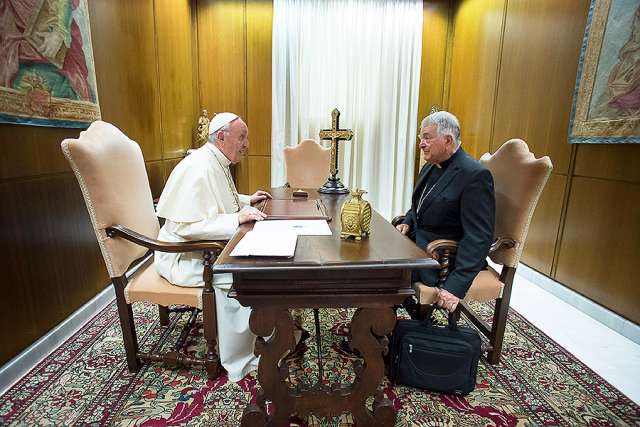For the first time, the papal nuncio to Italy is not Italian
For the first time ever, a non-Italian will serve as apostolic nuncio, or papal ambassador, to Italy. On Sept. 12, Pope Francis appointed Swiss-born diplomat Archbishop Emil Paul Tscherrig as his new ambassador to Italy.
Sep 13, 2017

By Andrea Gagliarducci
For the first time ever, a non-Italian will serve as apostolic nuncio, or papal ambassador, to Italy. On Sept. 12, Pope Francis appointed Swiss-born diplomat Archbishop Emil Paul Tscherrig as his new ambassador to Italy.
Archbishop Tscherrig has served most recently as apostolic nuncio to Argentina. Ironically, he was appointed nuncio there in 2012, replacing Archbishop Adriano Bernardini, who had been appointed nuncio to Italy.
Four years later, he is called to replace Archbishop Bernardini again.
Archbishop Tscherrig is a high-profile diplomat. Born in 1947, the first of eight children of a “Bergbauern” – mountain farmer – family, he was ordained a priest in 1974 and entered the Holy See diplomatic service in 1978.
He worked in the Secretariat of State as assistant to Fr. Roberto Tucci, preparing Pope St. John Paul II’s trips outside of Italy.
He served in several nunciatures before being appointed a nuncio: in Burundi from 1996 to 2000, in Caribe and Antille from 2000 to 2004, in Korea and Mongolia from 2004 and 2008 and in Scandinavian countries between 2008 and 2012.
With his 2012 appointment as nuncio to Argentina, he got to know Cardinal Jorge Bergoglio, who then served as Archbishop of Buenos Aires.
While relations have appeared cool between Archbishop Bernardini and Pope Francis, dating to their time in Argentina, Archbishop Tscherrig has long maintained a positive relationship with the Pope.
The appointment of a Swiss bishop as Italy’s apostolic nuncio ends the so-called “Italian exception.” Since Italy and Holy See established full diplomatic ties in 1929, nuncios to Italy have always been of Italian nationality. This was an “exception” because the Holy See usually desires that the “Pope’s ambassador” be of a nationality different from that of the country he is appointed to, in order to avoid any “national” influence in diplomatic affairs.
Apostolic nuncios have two main obligations: they maintain diplomatic relations between the Holy See and the nation to which they are appointed, and they represent the concerns of the Holy Father toward the local Church, conveying his intentions, and assisting in the appointment of new bishops.
The “Italian exception” worked because the nuncio to Italy has focused mainly on the appointment of bishops, while diplomatic and political issues have been managed on the basis of personal relations between officials of the Italian government and those of the Holy See.
Recent developments have changed that arrangement. The internationalization of the College of Cardinals, started more than 60 years ago under Pius XII, has become a solid reality – the Church’s cardinals hail from more than 80 different countries.
The staff of the Roman Curia – the offices of the Vatican – also has developed an international flavor: top posts and clerical jobs in Vatican offices are more frequently entrusted to non-Italian bishops or priests, though the official language is still the Italian. This change has eroded the natural relationships between the Italian government and the Holy See.
The appointment of a Swiss nuncio to Italy now ends the most visible “Italian exception” in the Vatican, and nearly ends the custom of reserving certain Vatican roles for Italians.
In fact, there is one remaining exception left for the Italians. There is an unwritten rule in Rome that the Holy See’s Secretary of State must be Italian, if the Pope is not Italian.
Until now, this rule has always been followed, with the only exception of Cardinal Jean-Marie Villot, who kept his post as Secretary of State when St. John Paul II was elected. He died March 9, 1979, a few months after St. John Paul II’s election, and was replaced with Cardinal Agostino Casaroli, a very skilled Italian diplomat.
Time will tell how long the last remaining “Italian exception” will hold.--CNA







Total Comments:0